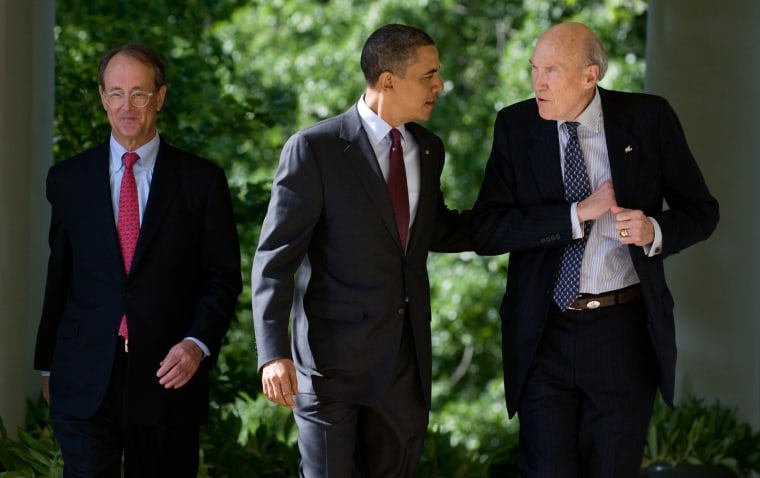President Barack Obama said Tuesday Washington must urgently confront unpleasant truths about deficits, while the Federal Reserve chairman said failure to mop up red-ink spending would "ultimately do great damage" to the country.
Obama refused to rule out measures that would fight "exploding deficits." This signaled that politically toxic tax increases were options that could be under consideration by members of a panel he tasked with reducing federal deficits that threaten to erode Americans' standard of living.
Obama explicitly told reporters in the White House's Rose Garden that neither he nor his commission members would say what options remain viable.
"We're not playing that game. I'm not going to say what's in. I'm not going to say what's out. I want this commission to be free to do its work," said the president, flanked by Erskine Bowles and Alan Simpson, the two men he asked to lead efforts to reach a consensus plan for the deficit.
It's a task, though, that even members of the bipartisan fiscal commission admit is an almost impossible chore: produce a deficit no bigger than $550 billion by 2015, an amount equal to about 3 percent of the total U.S. economy. That would require deficit savings in the range of $250 billion or more.
Federal Reserve Chairman Ben Bernanke used the commission's first meeting as a forum to make his most urgent call yet to get the government's fiscal house in order. He warned that failing to curb federal budget deficits would damage the U.S. economy in the long run.
Bernanke again urged the White House and Congress to come up with a credible plan to reduce the nation's red ink, which hit a record $1.4 trillion last year.
Failing to do so would push interest rates higher — not only for Americans buying cars, homes and other things — but also for Uncle Sam to service its debt payments, he said.
"The path forward contains many difficult trade-offs and choices, but postponing those choices and failing to put the nation's finances on a sustainable long-run trajectory would ultimately do great damage to our economy," Bernanke said.
Budget director Peter Orszag told the panel that Democrats and Republicans must work together to tame deficit-spending habits.
"If we allow the policy positions that divide us to prevent us from taking action, the projected medium- and long-term deficits will threaten the health of our economy and the living standards our people enjoy," Orszag said. "Sustained, growing long-term deficits will increase our reliance on creditors from abroad, reduce investment in our labs, factories, and businesses, and weaken confidence in the federal government's creditworthiness."
It may be easier to ignore long-term problems, Orszag said, "but we will pay a severe price if we do."
The deficit has turned alarmingly worse since the recession that started at the end of 2007. Many projections show it never dipping below 4 percent of the economy over the next decade. Deficits that size are unsustainable, economists say. They would put upward pressure on interest rates, crowd out private investment and ultimately erode living standards.
The quickly growing national debt — the accumulation of years of annual budget deficits — today stands at a staggering $12.88 trillion and the Congressional Budget Office expects the nation to add another $1 trillion a year for another decade. The federal government itself holds a large portion of this debt, some $4.5 trillion, with much of it sitting in the Social Security Trust Fund.
The remaining $8.5 trillion is held by worldwide investors in the form of Treasury bills and bonds. China is the largest single holder of these securities.
But the options for curbing the deficit — cutting spending on popular entitlement programs and broad-based tax increases — are so politically toxic that the only way Obama and his Democratic allies controlling Congress are willing to take them on during this midterm election year is through the commission.
The most obvious solutions, higher taxes or fewer government benefits, are the most toxic — one reason the 18-member panel has instructions to deliver its recommendations after the November election.
"You're going to have to raise taxes. You're going to have to cut spending," Urban Institute President Robert Reischauer said to the panel. "It's going to have to hurt."
Even before the panel convened, however, House GOP leaders issued press releases urging it to take tax increases off the table as a deficit-closing option.
Obama said that getting the job done is "going to require the people of both parties" to put politics aside. He said he's counting on the bipartisan panel to bring an end to "an already severe fiscal crisis brought on by decades of bad fiscal habits in Washington."
The panel is co-chaired by Bowles, a former chief of staff to President Bill Clinton, and Simpson, a Wyoming Republican.
